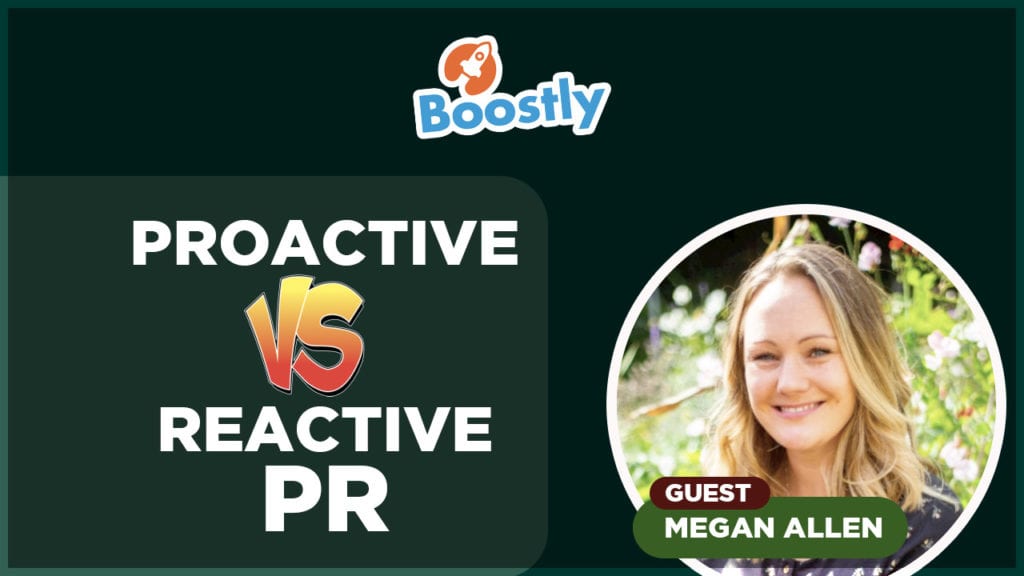Welcome to Boostly Podcast Season 11 Episode 113. This is a recap of my Facebook live where I talked about Proactive vs Reactive PR.
Here's the audio for this episode:
Here's the video for this episode:
Timestamp
00:00 Start
01:10 2 Types of PR
02:50 What is newsjacking?
05:20 How to build press relationships
Whilst you’re here
Follow Boostly on the following channels to get more tips, tactics and knowledge on how you can increase your direct bookings
Visual – YouTube
Audio – Boostly Podcast
Transcript from the Episode
Proactive PR is obviously pre planned. So pre pre planned PR activity. So if you have an event coming up or a new launch, or something along those lines you planned in that PR activity for you will know weeks in advance what you need, you will do lots of planning on who to contact, you'll do your research on what journalistic contact or you know, social media posts, you're going to put out what blogs you might write what newsletters all of these fall under the PR category as well as a huge crossover. So that's proactive.
Reactive PR is where something happens, obviously, in the press in the national arena, international arena, or even just locally, that you can react to that you can jump on the bandwagon of or what we call in the industry as newsjacking. So you will news jack that story. So for example, I mean, basically in the last year, all we've done is reactive because we've not known from day to day, what we can do what we can plan in, there's no point in promoting something in advance especially events when events haven't been able to take place. So we've been just newsjacking everything and making sure that we can react as on when we need to.
What is newsjacking?
Building your relationship with the press is really, really vital. And Twitter is absolutely the tool for that. So using hashtags on Twitter is a really great way of keeping on top of what journalists are looking for in articles. So if a journalist is writing an article on a particular subject, they will look for sources of information and they will go on Twitter and use hashtag journal request. They also use platforms like travel media responses, but they all cost money whereas Twitter is a free resource. So you can keep on top of what they're looking for. And if you can just reply to them or ping an answer back to them. A lot of the time they will put their email addresses in as well and send them some information that's relevant to that request that you can jump on top of and you can use jack. That's a great way of sort of building relationships because if you start reacting to them, they might not use you straight away but three or four occasions down the line, they'll get to know you, they'll get to, you know, recognize your face or your Twitter handle or whatever. And they'll know to look out for you. Or if they're writing an article, and they know that you've responded to them before, they might just come straight to you, which has happened to a lot of our clients a lot of the time. And sometimes journalists just pass us by completely as an agency and go straight to the client now, because they know they can give that information.
How to build press relationships
Research is the base of any PR campaigns. So researching who your audience is, and be, you know, what magazines or newspapers or media that they are using is really vital. So the best thing you can do is pick up a copy of that magazine or that newspaper. And as you say, research who's who the journalists are paying them an email just introduce yourselves. Hi kind of emails are so used to people just wanting stuff from them all the time. Sometimes it's nice to just build relationships that way. Normally, I'd say you know, you could always pick up the phone, but the moment you can't because everyone's working remotely, so knowing who to call and where is impossible. or sending them something like snail mail is so underrated. So you know, sending something in the post, but yeah, doing your research is really, really vital for that. So making sure you're building those relationships that way, and just reacting to things as well reacting to them on Twitter or Facebook or just again, getting your name out there.

Before you leave
Please go and rate, review and subscribe on iTunes, Spotify Google Play or Anchor or visit Boostly Hospitality Podcast for the full list of episodes!
If you have enjoyed this post and want to feed my caffeine addiction you can “Buy me a coffee” ️

